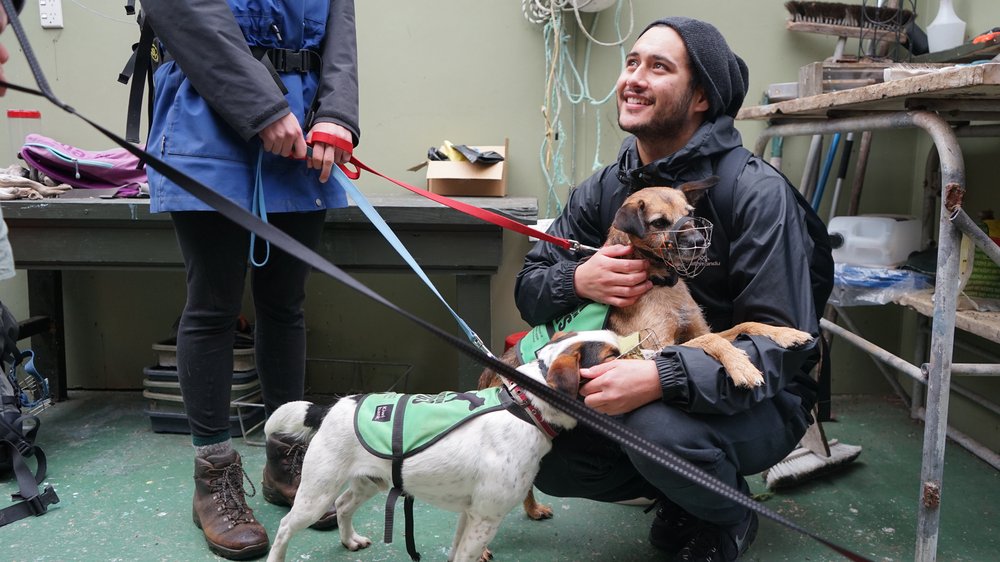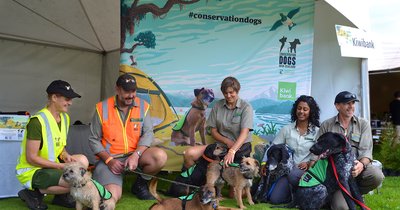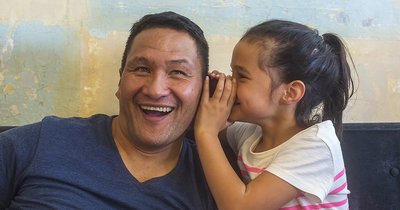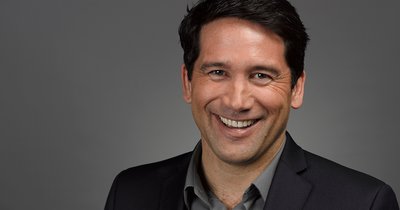A pack of specially-trained Conservation Dogs has been unleashed on Auckland’s offshore islands to guard our unique native birds against predators.
The pest-free islands of the Hauraki Gulf are Auckland’s favourite marine playground and a global hot spot for endangered birds, yet sneaky predators like possums, stoats and rats are always looking for a breach in the islands’ defences.
In November 2016, a pack of 20 specially-trained conservation dogs and their handlers converged on a dozen islands in the inner Hauraki Gulf for a week. The dogs also searched for predators in the pest-free sanctuaries of the Shakespear and Tāwharanui regional parks.
The initiative was made possible by Kiwibank’s new sponsorship of the Department of Conservation’s Conservation Dogs Programme. Kiwibank is joining DOC and Predator Free New Zealand in their battle to help the country achieve its goal of eradicating predators by 2050.
Eco-friendly pest detection
New Zealand was the first country in the world to use dogs for conservation, and is now a global leader in the field. We have 55 dogs trained to find protected species, and 25 predator dogs who sniff out destructive pests such as rats, rabbits, stoats, possums and feral cats.
Dogs’ extraordinary sense of smell enables them to find predators up to 40 times faster than would be possible with other methods, saving DOC significant amounts of money and time. They deliver results instantly, with near-perfect accuracy, and are a non-invasive and eco-friendly way to detect pests.
The Hauraki Gulf is an important breeding ground for 25 species of seabird, many of which are fighting for their survival. Fin Buchanan, who runs the pest detection team of the Conservation Dogs Programme, says it’s vital that the islands’ pest surveillance network of traps, tracking tunnels and chew cards is periodically checked.
“We always thought it would be great to get all the pest detection dog handlers together to do a blitz on the pest-free islands in the Hauraki Gulf, but DOC could never afford it. Kiwibank’s sponsorship of the Conservation Dogs Programme has made this possible,” he says.
“It gives conservation a big voice.”
Cat and mouse game
In addition to being exceptional pest detectors, Conversation Dogs are an important tool in educating Kiwis about the need to protect our natural environment from predators. Fin’s dog, Pai, and Pai’s half-sister, Piri, have their own Facebook page and are a huge hit at public events.
Fin says the Hauraki Gulf predator blitz was a chance for experienced handlers to share their skills with newbies. DOC also brought along experts to update the handlers with information about small mammal science and to conduct scent detect ability trials.
The dogs didn’t come away from the Hauraki Gulf empty-pawed, finding signs of a feral cat in Shakespear Regional Park and a mouse on Motuketekete Island.
DOC will now be able to target its pest control efforts to the areas where the predators were discovered, helping to conserve our extraordinary wilderness areas for generations to come.
The Conservation Dogs and their talented handlers are active all over New Zealand. You might be lucky enough to meet them at wharfs, ferry terminals, island and mainland sanctuaries, in the national parks or perhaps even at your local Kiwibank branch so keep an eye out when you're exploring our backyard!
Want to find out more? Stay up to date with the programme by visiting the Dog Programme section on DOC's website or check out Kiwibank’s social media channels.



